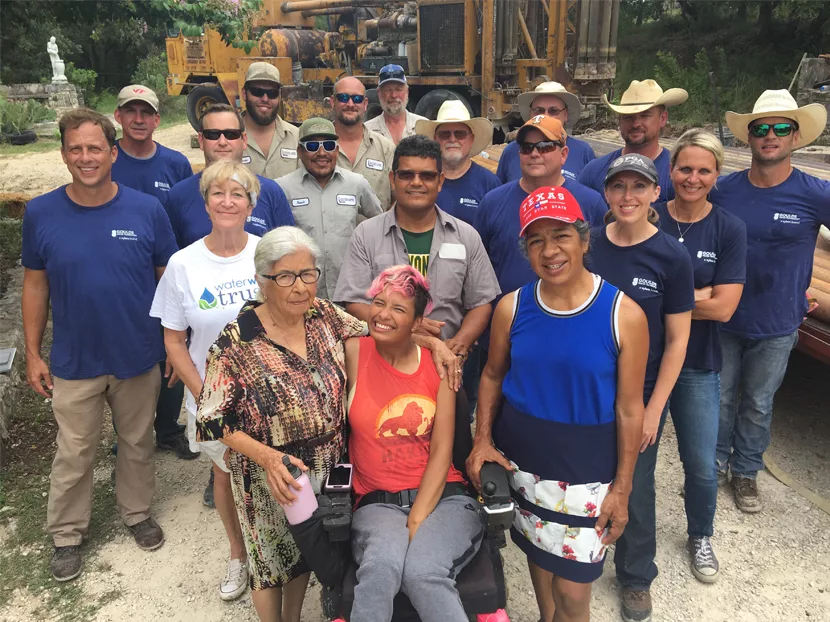Water insecurity is widespread in rural communities throughout the United States. Often, low-income families living in these isolated, difficult-to-reach areas can’t afford the cost of public water service or extending municipal water lines to their properties doesn’t make economic sense.
Such was the case for the Salazar family of Bulverde, Texas, near San Antonio. Luis and Nancy Salazar, along with their daughter Nissi, had lived in their home for 24 years without their own water supply.
For more than two decades, the Salazars made do with sharing water from the well located on the neighboring property owned by Nancy’s parents. Because of the shared well’s low yield, the Salazars could not wash their cars or plant a garden. Even the idea of a long, hot shower was a luxury.
“I’ve never known what it’s like to have really good water pressure,” Nissi Salazar says. “I’ve never known what it’s like to take a nice, hot shower. It’s just not part of my life.”
Financing and building a water well posed a significant financial challenge to the Salazars, who devoted much of their modest income to caring for Nissi, who has cerebral palsy.
In 2019, Nancy’s parents, now in their 90s, decided to move from their long-time home. As a result, drawing from a shared water source would no longer be possible.
Nancy Salazar began researching how to finance a private well. During an Internet search, she came across the website for the Water Well Trust (WWT), a nonprofit arm of the Water Systems Council, which was established to provide wells for Americans who do not have a safe drinking water supply. But when Nancy called the nonprofit, she learned the WWT did not have funding for projects in Texas and was placed on a waiting list.
Serendipitously, a Xylem representative contacted the WWT around the same time to express interest in volunteering on a water well project in Texas. The WWT immediately called Nancy Salazar, who completed an online application. Soon after, the Salazar family qualified for a grant due to their need and income status.
Working together
Xylem enlisted help from Austin Pump & Supply, an area pump distributor, which assembled a team of volunteers and helped coordinate product donations from several manufacturers. H.W. Schwope & Sons, a local contractor, provided drilling services at a discounted labor rate and additional materials for the new well.
Ryan Arnett, an executive for the pump distributor, commented on the eagerness of people to donate their time, services or funds. “It was surprising how many people were looking for an opportunity to help,” he said.
In July 2019, a drilling crew assessed the Salazar property and identified the best location for the well. Geology and underground water levels ultimately dictated the need for a 500-foot well.
Along with product donations secured by the distributor, Goulds Water Technology, a Xylem brand, provided the well pump, control box and holding tank for the project. It also supported the WWT with a $5,000 grant through Watermark, Xylem’s corporate citizenship program.
The well was outfitted with a 7 gallons/minute, 1 1/2 horsepower, 4-inch submersible pump with a CentriPro motor, a CentriPro control box and a HydroPro 83.5-gallon tank. Crews also laid down more than 400 feet of new piping and 500 feet of new electrical wiring.
To prevent damage to the motor and pump, a CentriPro PumpSaver was installed to protect against dry well conditions, low and high voltage, over and under current, rapid cycling, dead-heading and jammed impeller.
Overall, with assistance from the nonprofit partner and corporate citizenship program, as well as donations of products and services, the final project cost came in around $6,500. In contrast, hooking into the closest public water supply would have cost nearly $85,000.
“This project is a perfect example of why the Water Supply Costs Savings Act is so important,” said Margaret Martens, WWT executive director.
Signed into law in 2016 by President Barack Obama as part of the Water Infrastructure Improvements for the Nation Act, the legislation aims to reduce local, state and federal costs of providing high-quality drinking water to millions of Americans in rural communities by increasing the use of cost-effective alternatives such as water well systems.
Making a difference
Following the installation of the new well system, more than 35 volunteers came together to clean up the Salazar’s yard. Despite a record heatwave with temperatures topping 100 degrees, the cleanup effort involved hauling away scrap metal and bringing other debris to the local dump. The crew also built a coop for the family’s flock of chickens to make it easier to collect eggs.
After spending five days helping the Salazar family, project volunteers left with a strong sense of community, having shared their skills and expertise to help a deserving family while building relationships and making a meaningful impact.
After living in their home for 24 years without their own water supply, the Salazar family is thankful to now have access to safe, clean water. In a letter to the WWT, Nancy Salazar wrote:
“Words cannot express the gratitude we feel for providing the water well for our family. Everyone that came was so kind and served us so well. We now have our own water well running water to our house. You can’t imagine how awesome that feels.”
Now the Salazars are paying it forward. In October, the family attended a Water Systems Council meeting where Nissi Salazar addressed a large audience to help raise awareness and funding for the Water Well Trust. The event raised $250,000 to help provide water wells for Americans across the country in need of safe drinking water.




